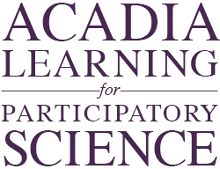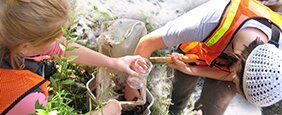Background for Teachers
Scientists often engage in debates about their hypotheses and approaches. These can be verbal or on paper, and are often called "peer review". This type of constructive criticism is very important and helps scientists see how they might improve their work to get more definite answers, or to see things they might have overlooked.
This activity engages students in a type of peer review by having the class as a whole review each other’s hypotheses and study designs. Discussions should focus around questions such as:
- Why do you think that?
- Have you considered…? (For example, a competing explanation for how a system might work.)
- When you are collecting data, won’t it be confusing if … (A good example of this would be a student proposing to look at the relationship between flow rate and nitrogen without paying attention to season.)
- Couldn’t you also measure…? (For example, suggesting that students collecting tree density also keep track of the kind of tree, just in case it might matter.)
A key objective in this kind of exercise is helping students learn a different kind of discourse—one that is not personal, but is instead focused on leading to general improvement. You can help students see the importance of this by reminding them that others will use the results. Some students may have to play the role of "devil's advocate" - sometimes making an argument that they are not sure of, but that they think needs exploring. This type of thinking and healthy debate can lead to better projects and new ways of working.
You may have to ‘seed’ the discussion by beginning the discussion with “What part of the nitrogen cycle/season are you focusing on?” or “How will you use those data to support your claim?”
You may want to prepare students who have questionable (non-testable) claims by asking, “What will you do if there aren’t any data of the kind you need to address your claim?” This scenario occurs frequently. Students might be able to re-focus on another question from their brainstorming sheet.
A good resource for classroom discourse of this type is found in from the National Academies Press (2007). The book is geared toward middle school science classes, but if norms for argumentation have not been set in your district then chances are that this is an unfamiliar type of classroom discussion and will need scaffolding and modeling. (read the chapter here: )
Remind students that if they contradict or challenge each other then they need to give the reasoning behind the contraction or challenge.
Goals
- Students engage in constructive feedback
Outcomes
- A refined research question and hypothesis based on input from peers
Where does this lesson happen in the Project?
This is the second lesson in Unit 3: Questions and Claims
Getting Ready
Students should have their hypothesis ready.
Materials
- Student’s hypothesis worksheets from Activity 1: Research Question and Hypothesis
- White board for students to draw or expand on any one of their ideas (especially to show their hypothetical graph)
Handouts (see also Lesson Resources)
As this is a classroom discussion there are no handouts. You can make this an activity where one group reviews another group’s work.
Student Prerequisites
- Students must have their question, hypothesis and hypothetical graph ready to present
Time Needed
One class period
Doing the Activity
Ask each group to present their question, hypothesis (in an ‘If, Then…Because’ statement), the data they will use to support their hypothesis and their hypothetical graph. The rest of the class can then ask clarifying questions and make suggestions.
Assessment
Formative
Ask your two ‘seed’ questions: Do your students seem comfortable with their ideas? Do they answer everyone’s questions well? Have they spelled out what they’ll need for data to answer their question (and can they get those things)?
Summary
Ask for students to write feedback for each of the other groups. Ask them to include at least one question about the experimental design. Students refine their hypotheses, and demonstrate that
they have incorporated the feedback from the class.
Lesson Extensions and Supplements
None.
Lesson Resources

 Acadia Learning brings scientists, teachers, and students together in partnerships that result in useful research and effective science education.
Acadia Learning brings scientists, teachers, and students together in partnerships that result in useful research and effective science education.